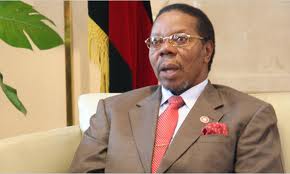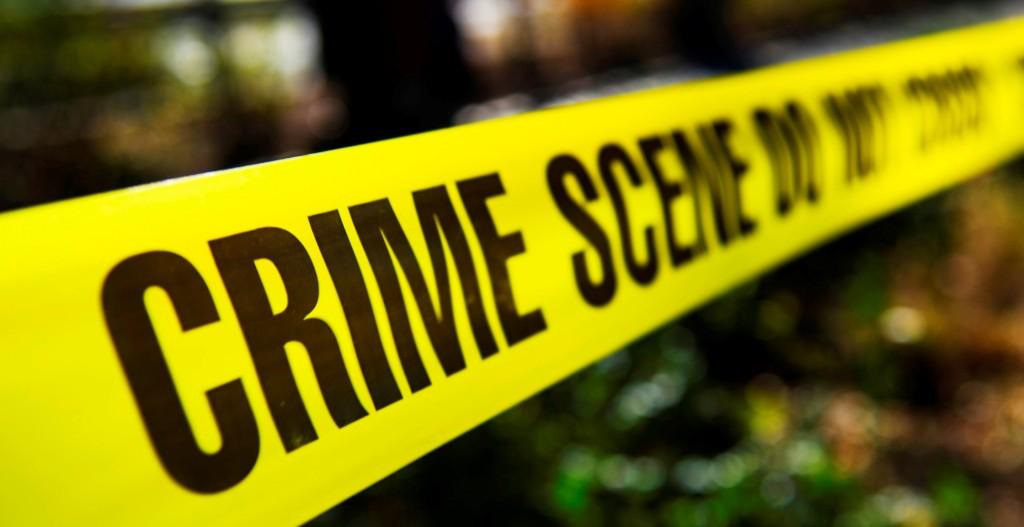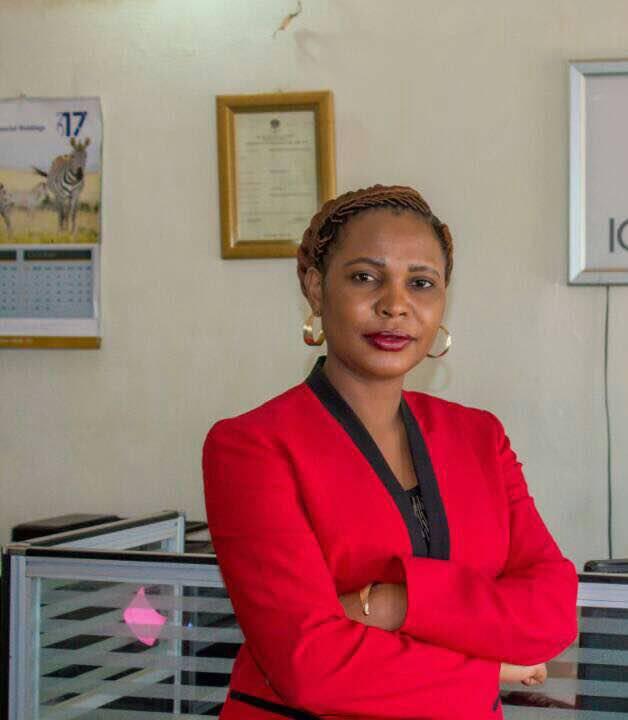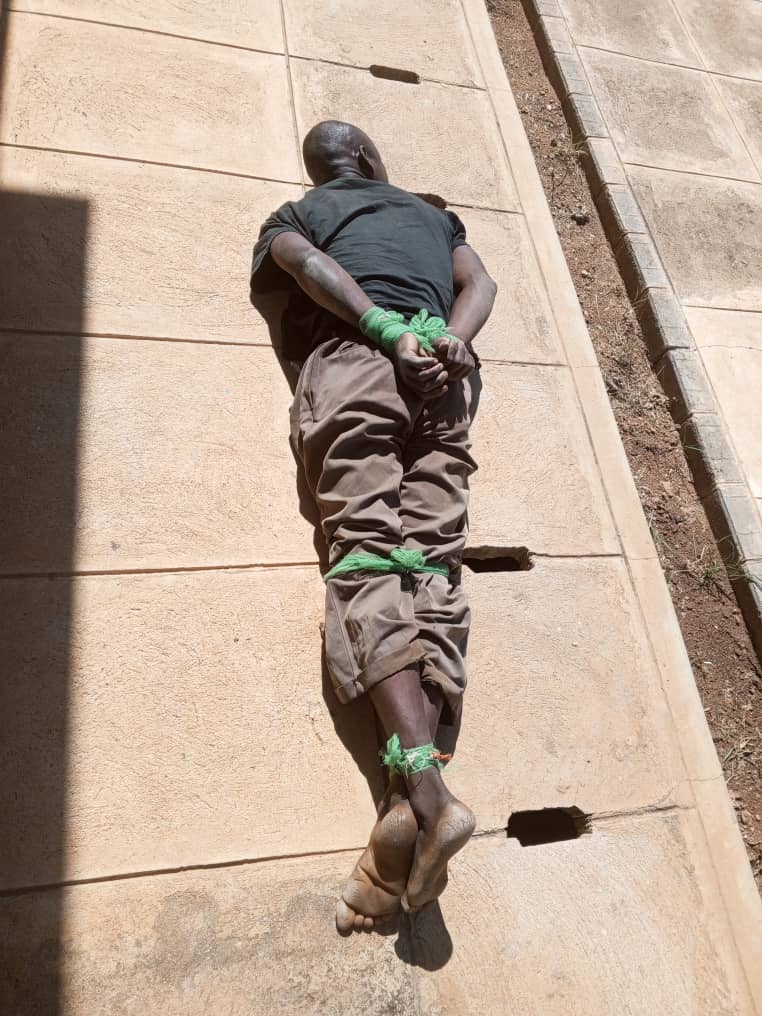We come before Your Excellency as members of the Commission of Inquiry which Your Excellency appointed by Order issued under your hand on 1st June 2012 to inquire into the circumstances surrounding the death of the late President of the Republic of Malawi, His Excellency Ngwazi Prof. Bingu wa Mutharika, who died a sudden death while in office as President of Malawi in April 2012 and also to inquire into issues of transition of State power following his death.
Allow me Your Excellency at this point to introduce members of the Commission who are here today.We have Mr. Joseph Aironi, Retired Inspector General of Police; Dr. (Mrs.) Tiwonge Loga; Dr. (Mrs.) Elizabeth Sibale; Father Joseph Mpinganjira; Mr. Brian Nyasulu; Mrs. Esther Chioko; Mr. Jabbar Alide; and I am Justice Elton Singini, SC, a retired Justice of Appeal in Malawi, and Chairperson of this Commission. One of us, Dr. Charles Dzamalala, a pathologist, left for further studies in Australia midway through the Inquiry.
As I reported to Your Excellency at the time of his departure, the Commission did not seek to have him replaced since by that time we had covered much of the ground on the aspect of death on which his expertise and participation was most needed. We however kept in constant touch with him and briefed him on matters for which we desired his input. We do wish him well in his studies.
We have reports Your Excellency that he is actually topping his class there. I should also introduce Mr. Pacharo Kayira, Senior Deputy Chief State Advocate in the Attorney General’s Office, who has been the Secretary to the Commission.
After issuing the Order appointing our Commission, Your Excellency left the country on an official trip and delegated the Vice President to administer our oath of office. Thus, the Commission was sworn into office on 4th June 2
2012 before the Vice President, Rt. Hon. Khumbo Kachali, at a ceremony held at the Office of the President and Cabinet at Capital Hill, Lilongwe.
The Commission could not start on the work of its core mandate, that is, to conduct the Inquiry, until the Order of its appointment, as a statutory instrument, had been published in the Gazette which was on 22nd June 2012. However, before that date the Commission met a few times over administrative matters, such as to draw up its work plan and also to consider the activities that were likely to be included in the budget for its work.
The Commission started to conduct the Inquiry on 9th July 2012 and commenced with a visit to State House in Lilongwe. This was because in our work methodology we decided to approach the Inquiry by following the course of events as they had occurred from the 5th of April, when the President collapsed in the Presidential audience room at State House, to the date of his burial on 23rd April.
Apart from the visit to State House we also visited Kamuzu Central Hospital in Lilongwe where the President had been rushed to after his collapse and we also visited Kamuzu International Airport through which the President was evacuated to South Africa. The purpose of these site visits was to enable the Commission appreciate visually the settings in which the critical events of activity occurred particularly on the day of the President’s collapse.
We are grateful that Your Excellency allowed us the opportunity to undertake the site visit to State House which we needed in relation to our work. Our visit to State House greatly facilitated the start and direction of our work.
As the Inquiry progressed the Commission assigned three of its members to travel to South Africa, namely, Commissioner Mrs. Chioko, Commissioner Mr. Airon and Commissioner Mr. Brian Nyasulu. They were accompanied by the Commission Secretary, Mr. Paharo Kayira. The purpose of the visit to South Africa, in particular to Johannesburg and Pretoria, was to trace the route and places the body of the late President was taken to in that country from the time of its arrival there to the time of its repatriation to Malawi and also to interview members of staff at the Malawi High Commission in South Africa who played a role in that connection.
When they came back, the three Commissioners reported that they were well received and conducted around by the staff of the Malawi High Commission led by the Deputy High Commissioner, Mr. Alexious Godiya, in the absence of the High Commissioner, 3
Mrs Agrina Mussa, who had been recalled from her post by the time of the visit.
Your Excellency, when we started our work we all accepted and hoped that we would complete the Inquiry within the period of two months prescribed by the statutory Order, under which we were appointed, as the period for the Commission to complete its work and present its Report to Your Excellency. However, that was not to be. We soon found that the period of two months was a gross underestimate of the time we needed to conclude the Inquiry.
The scale of this Inquiry, Your Excellency, was huge even just from the sheer numbers of persons that came to testify before the Commission, totalling 123 in all. So, Your Excellency, we carried on beyond two months as we had to until we completed the Inquiry in just under seven months, on 31st January 2013, when the Commissioners appended their signatures to the Report and when, on behalf of the Commission, I informed Your Excellency by memorandum that the Commission had completed the Inquiry up to compiling its Report.
I however indicated to Your Excellency in that memorandum that the Commission needed about a fortnight to have the Report printed by the Government Printer for presentation to Your Excellency in printed and bound form.
Today, Your Excellency has graciously granted us audience during which we are to present our Report to Your Excellency. It is therefore our honour and privilege, as Commissioners, to present the Report to Your Excellency at this point of our audience; and to that end, may I ask all of us Commissioners to stand as I, on your behalf, move forward towards Her Excellency to present a copy of the Report and thus to mark the official presentation of the Report.
Now that Your Excellency has a copy of the Report before you, I wish to say a few words, and indeed only a few words, about the contents of the Report. I say only a few words because, Your Excellency, it is not the intention of the Commission through this occasion of presenting the Report to Your Excellency to draw Your Excellency’s attention, nor the attention of the general public, to particular parts or contents of the Report.
It is our recommendation Your Excellency that our Report is to be read as a whole since all parts of the events of the episode covered by this Inquiry are related. Accordingly, on this occasion of presenting the Report to Your Excellency, we wish merely to highlight in broad outline only the scope of the Report.
The Commission understood its mandate to centre mainly on two issues, that is, the sudden death of President Bingu wa Mutharika and the events of political transition following his death up to the swearing in of the successor President who was Your Excellency.
This Report Your Excellency has told the two-part story: the story of the death of President Bingu wa Mutharika and the story of the political transition in considerable detail that depicts in some cases very minute details and graphic presentation of some of the events that took place.
Your Excellency, the Commission also considered to be within its mandate to extend its Inquiry to what were widespread reports of looting and missing of Government property at State House during the period of transition.
The Commission further considered it proper for it to inquire about certain unusual occurrences and issues during the period close to the President’s death that could have exerted extreme pressure on him, as a human being, as to possibly endanger his health given that he died a sudden death from collapsing.
These were occurrences and issues such as: the absolute ultimatum by very influential and respected civil society bodies and other interest groups in the country demanding the President to resign within 60 days or to hold a referendum on the popularity of his administration within 90 days, failing which the groups would organize nationwide demonstrations against his administration; open signs of a failing economy reflected in severe shortages of fuel supplies resulting in long queues of motor vehicles at fuel stations throughout the country; severe shortages of foreign exchange affecting business operations; openly strained diplomatic relations with the United Kingdom, critically the former colonial power in Malawi, and also with some of Malawi’s neighbours, notably Zambia; withdrawal of programmes of financial and economic support to the Malawi Government by the World Bank and the IMF and withdrawal or suspension of aid by several major development partners, which severely affected Government budgetary operations. 5
Further, Your Excellency, among the unusual occurrences the Commission also recognized the widely publicised prophesy by T.B. Joshua, a Nigerian evangelist, which predicted the death of an African President in regions other than the West Africa region. In the aftermath of the sudden death of President Mutharika the evangelist displayed a letter he had received from President Mutharika and somehow connected the letter to some act of acknowledgement by the Malawi President of the power of his prophesy; and Malawians openly wondered if there was indeed a connection and what the letter by the President was about.
The Commission has made pertinent findings on all these aspects of its mandate. Perhaps in difference to what I have said that the Commission does not intend at this occasion to give details of the contents of the Reports, I can mention Your Excellency that on the aspect of death the findings of the Commission are that—
(a) On 5th April 2012 President Bingu wa Mutharika collapsed at State House in the Presidential audience room at around 11: 10 am and was taken into an ambulance rushing him to Kamuzu Central Hospital. He died on the way to the hospital and that was within minutes of his collapse before the ambulance reached hospital. The ambulance arrived at the hospital at about 11:25 am and the President was brought in dead;
(b) Medical personnel at Kamuzu Central Hospital nonetheless made attempts to resuscitate him but that was already too late. At around 2:30 pm doctors at the hospital pronounced him dead and informed the authorities of that fact;
(c) The cause of death of President Bingu wa Mutharika was irregular beating of his heart at that moment of his collapse, called cardiac arrhythmia, which resulted in him suffering a cardiac arrest.
(d) President Bingu wa Mutharika had a history of heart attack having suffered a minor heart attack in 2009.
Your Excellency, I should point out that, as regards the finding on cause of death, the Commission did not have the chance to look at the post-mortem report of the late President. The Commission made efforts to get the post-mortem report from the hospital authorities in South Africa but failed. We were informed that up to the time we finished the Inquiry, by 31st January this year, the report had not been issued by the doctors in South Africa. Earlier we had sought the intervention of Your Excellency for us to get the post-mortem report and we are aware that Your Excellency did make necessary contacts at your level. We understand that those contacts by Your Excellency have now resulted in the release of the post-mortem report of late President Bingu wa Mutharika which was to be handed over to the Malawi Government through the Office of the President and Cabinet (OPC), in particular to the Chief Secretary in that Office.
However, we also understand that the South African doctor who was assigned to bring the report to Malawi and to hand it personally to OPC decided, when he was in Malawi, to hand the report instead to the late President’s family and did actually hand it to one of the children. This happened some three weeks after the Commission completed the Inquiry and has had its Report printed.
With this information, the Commission met over this matter of the post-mortem report now being in the possession of someone within the Malawi jurisdiction. The Commission resolved nonetheless to proceed to present its Report to Your Excellency as already printed considering that the Commission had already wrapped up its business.
Thus, as stated in the Report now before Your Excellency, the Commission has made its finding on the cause of death based on the testimony it received and from the Notice of Death completed by the doctors in South Africa which recorded the preliminary finding on cause of death.
As it was required to do under its Terms of Reference, the Commission has made several recommendations on various matters emanating from the issues covered in the Inquiry. There are recommendations concerning health care facilities available to the President on which, among other things, the Commission has recommended the establishment of a state-of- the art VVIP medical facility to be located at the headquarters of the Malawi Defence Force in Lilongwe for the medical treatment of the President in sickness, as well as in death, and this would also be to guarantee State security that goes with a person holding office as President.
Your Excellency the Commission considers that its Report makes many other worthy recommendations about the health care of the President and to address or avert the occurrence of a crisis of a constitutional order similar to the crisis that engulfed the country and was the subject of this Inquiry and about other matters covered in the Inquiry. The Commission commends all these recommendations to Government for serious consideration.
Your Excellency, the Commission wishes to state that this Inquiry was not a criminal investigation but rather it was an Inquiry to unravel the events of the period. However, the Commission is of the view that relevant authorities will be able to draw whatever conclusions they may deem proper from the facts as laid bare in this Report.
Further, Your Excellency, there is no doubt that this Inquiry was of immense interest to the general public in Malawi. It is also a public Inquiry of considerable significance in the history of this country, particularly in regard to constitutional and political development of post-colonial Malawi.
The Commission therefore recommends that it may please Your Excellency to direct that the Report of this Inquiry, which we have presented to Your Excellency today, be made accessible to the people of Malawi as soon as possible through media dissemination among other means. Indeed, Your Excellency, it is the recommendation of the Commission that the Report, as a public document, could be reproduced for wider distribution including to public libraries for generations of Malawians to discern what they can from it.
In conclusion allow me, on my own behalf and on behalf of my fellow Commissioners, to thank you, Your Excellency, for the honour and recognition accorded to us by this appointment to serve our nation in this capacity.
This was not an easy task and by the very nature of the crisis that was the subject of this Inquiry it could not have been, and was not meant to be, an easy task. However, as Commissioners we come before Your Excellency confident that we have delivered on our mandate. We appeal to all authorities, and indeed to all Malawians, to read this Report carefully and in full and to draw lessons for the country’s governance now and in future.
Also allow me, Your Excellency, to thank my fellow Commissioners for the dedication with which they served on the Commission. As a long serving public officer myself, though now retired, I can say to Your Excellency that the country has some of the finest brains among the Commissioners that served on this Commission. To my fellow Commissioners, I say that when we came 8
together we started as strangers to one another and now, having spent seven months working together on this task, we part ways literally as members of the same family. And I know that we all cherish the valuable experience of service to our nation that we have gained through this work.
Your Excellency, we also had a very dedicated and diligent team of support staff. They were led by the Secretary to the Commission, Mr. Pacharo Kayira, and included five police officers (three men and two women), two court reporters who provided short hand for the verbatim record of the proceedings, a research officer, accounts officers and administrative officers and two drivers. We acknowledge the part they played and we do thank them all.
We also wish to acknowledge the financial and administrative support we received from the Office of the President and Cabinet under the leadership of the Chief Secretary for our work and throughout the period of our tenure.
We also thank various institutions, mostly State institutions and media houses, both print and electronic, for documents and extracts of printed and broadcast material they kindly obliged to provide to the Commission for its work.
The Commission worked mostly from Ufulu Gardens Lodge in Area 43 in Lilongwe. The arrangement provided very suitable setting for the work of the Commission and we would like to extend our sincere thanks to the management and staff of Ufulu Gardens Lodge.
We moved our venue only on very few occasions to Blantyre and to some lakeshore resorts in Mangochi and Salima. In a special way we would like to thank former President of the Republic of Malawi, His Excellency Dr. Bakili Muluzi, for receiving us at his BCA Hill residence in Blantyre where we interviewed him to the mutual convenience of both himself and the Commission.
Lastly, but by no means least, we thank all the individuals, high and low, who came before the Commission to testify. Virtually all persons we summoned or invited did come to testify before the Commission or to give their opinion to the Commission on critical issues. Some of them were summoned to appear more than once and they obliged. It is their stories that have been captured in our Report and, we believe, with proper balance. 9
I must apologise for taking so much of Your Excellency’s time, but it reflects the gravity of this Inquiry.
I thank you, Your Excellency.
6TH MARCH, 2013





No comments! Be the first commenter?